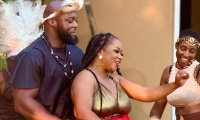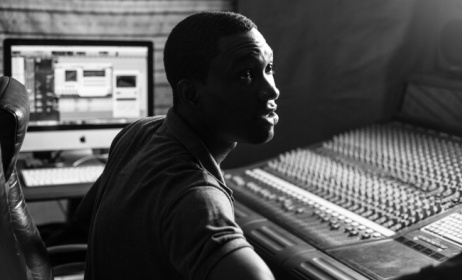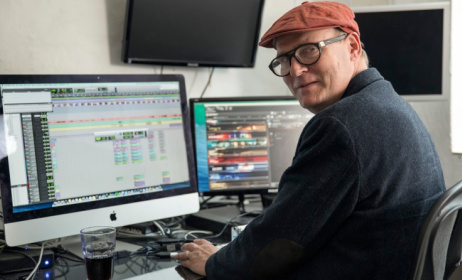Interview: Sibot
Sibot (aka Simon Ringrose) has become one of the cornerstones of the electronic music scene in South Africa. Alongside the likes of Felix Laband and Markus Wormstorm, he introduced a dynamic sound which continues to cause ripples through numerous acts who all allude to being directly influenced by his music. Relentless in his pursuit of the next thing, Sibot has proven time and again that innovation is first and foremost in his creation process. We visited his studio to discuss music and dredge up inevitable questions about the demise of Max Normal, precursors to Die Antwoord.
 Sibot.
Sibot. Sibot. Photo: Tseliso Monaheng.
Sibot. Photo: Tseliso Monaheng. Sibot with Playdoe.
Sibot with Playdoe.
Where did it all start for you?
I think I started out in school. A friend of mine started buying records; the only records we had access to were like, drum-n-bass records. I was kind of intrigued why there was so much hype around these anthem DJs. We used to just mess around with these records, and kinda learn how to beat-mix with that. That was a huge step for me, and I was like ‘oh, that’s not so hard, it’s pretty easy’. Then I kinda got into DJ Krush. DJ Krush was a big original inspiration for me. He seemed to be doing these mixes of his own music. So my plan was like that; fuck being a DJ; make music, put it on record, and then play your own stuff. I took it further years later, started working with rappers. Samplers were the next step, and I’m still on that step now. I actually gave up DJing to focus on just playing live and producing.
Through the years you’ve been involved with a lot of musical projects, and perhaps the one most people are familiar with is Max Normal. What was your part in that project?
I was in Cape Town, and I moved back to Joburg. I met Waddy downstairs, underneath Cool Runnings, there was a party somebody asked me to play at. He loved the music I was playing, and I was scratching a bit, and then he wanted to come around to my house, so I was like ‘okay’. I had a really shitty set-up, such shitty turntables. I just scratched a bit for him, and he loved the fact that I could scratch words, and then let the word go. He was like ‘you’ve got to come to my band practice’. He had just done a gig at Oppikoppi with some other band, he had a feature, and the owner of Club 206 saw him and encouraged him to put a band together. So I joined the session, and I became friends with Sean (Ou Tim) and Mark (Buchanan). It was so easy!
The band needed another sound, another layer. I struggled at first like ‘what am I actually gonna do in this band’? So I spent my days going through old records, finding samples, classical things that I could see in a loop, and I would mark those off so I’d have them on cue. And then I would take those off to rehearsal. Sean and Mark would then figure out the key, and they would play on top of that. I wasn’t like a ‘let-me-scratch-in-the-middle-of-the-track’ kind of DJ, I was actually in the middle of the samples.
The Fantastic Kill project was the first time we heard of Spoek. Did you meet him around that period?
No, we went to school together. He was really serious at school, like this hip hop head who was lank conscious and serious. I used to be like that too in the beginning. But meeting someone like Waddy and Markus, hanging out with them… kinda taught me how to laugh at myself and not take it so seriously. It changed both of our careers, I think at different points, where we realised that there’s so much more going on. After doing In with the Old French label Jarring Fx wanted to do a tour, and I was at a point where I didn’t really have a show, so I needed to make something that was club-viable. So I asked this VJ if he would come with me, and we’d have to build a new set, and he was keen. And I told Spoek about it, and that I was gonna be playing with M. Sayyid from Anti-Pop Consortium, and he was like ‘you’ve got to take me!’ It was just after Sweat.X had been touring, doing their own thing. So we started something else; we didn’t wanna do the Sweat.X house music/electro music thing. We wanted to make a rap crossover kind of thing. So, based on that tour we started Playdoe. That’s actually the project that’s been recognised the most.
Let’s talk about your production process. How does that work?
Um, this is a bit influence for me [goes to his wurlitzer keyboard]. I’ll often write something on here, and then once it’s on there, I’ll start to produce it.
It’s interesting because you actually write the music. Is that important in your creative process, the musical element?
Absolutely! I think after scratching, I always felt like I was in these bands of musicians and I couldn’t communicate with them. Felt like such a noob most of the time; I just kind of wanted to learn more. From that scratching stage, I just started learning drums, piano… I play like a child, but I’m a lot more musical than I was...
Originally published on 21 February 2012 at Mahala.


































Comments
Log in or register to post comments